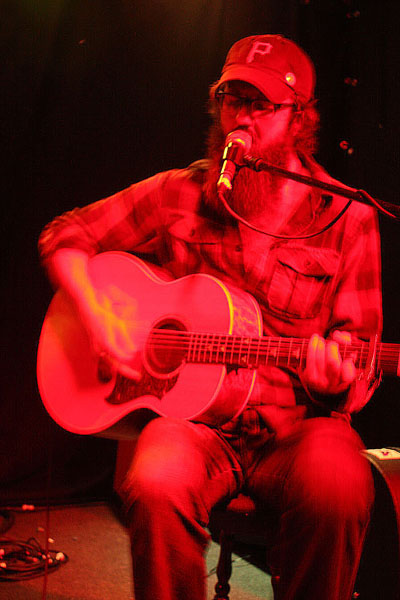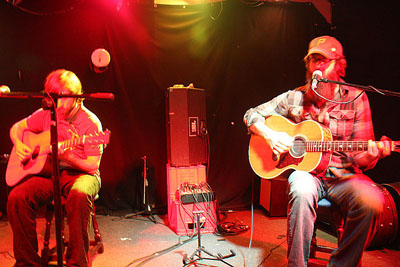Freebutt, 21 August 2009
His name echoes those of colonels and soldiers who fought in the American Civil War; William Fitzsimmons is a songwriter, an insightful eccentric, complete with trucker hat, impressive beard and glasses. His music is evocative of campfires and snowy pine forests but the campfire stories he tells are of his own heartbreak and divorce, the chronicle of a failed relationship. No, come back…
We know when we’re on dark territory when William announces, as a joke, that the first song is about death. Each song follows on and is related to the previous one, mournful but strangely uplifting. The vocals are as delicate as snowflakes, showing layers and levels of depth which keep the audience spellbound. The unfurling tale of William Fitzsimmons’ recent failed marriage (he was dumpee rather than dumper) is lyrically and melancholically narrated throughout. “You Broke My Heart”, “Find Me To Forgive”, “Please Forgive Me (Song of the Crow)” and “Passion Play” are four wound-bearing songs.
This is dubious and possibly self-indulgent ground, but his music is inspired and breathtakingly beautiful. Fitzsimmons has the humanity to transform his deeply personal experience into a universal one. Fitzsimmons’ pleading “The Sparrow and the Crow” was written as an apology and a confessional to his former wife…and then set to music. The result is a set of hushed and heartbreaking songs, which chart a path from regret to reconciliation. The music is so raw you wonder if Fitzsimmons is reading straight from his diary. He spares us the details – the spell wouldn’t be quite so convincing if he didn’t. If there are any doubts that the relationship being sung of is retrievable, another layer of sadness is added by the accompaniment of Justin Shaw on guitar, who is responsible for flashes of magic throughout the evening.

Happily, the clouds are allowed to lift a little between songs due to Fitzsimmons’ quips about Lady Gaga and being called a ‘wanker’ for the first time in his life by a passer-by in Brighton. He seems genuinely touched by the “awesome” reaction of the crowd to him. There is even a singalong, with everyone invited to learn the chorus for “You Still Hurt Me” – and the audience do so with gusto. The whole set seems cathartic for Fitzsimmons, who ends by looking forward to a better life – still looking back but doing so less and less. Magical.
Words by Isabel Owen
Photography by Liz Chambers
myspace.com/williamfitzsimmons
Like, share, comment, post updates, groups etc -join XYZ Social! (FREE!)

